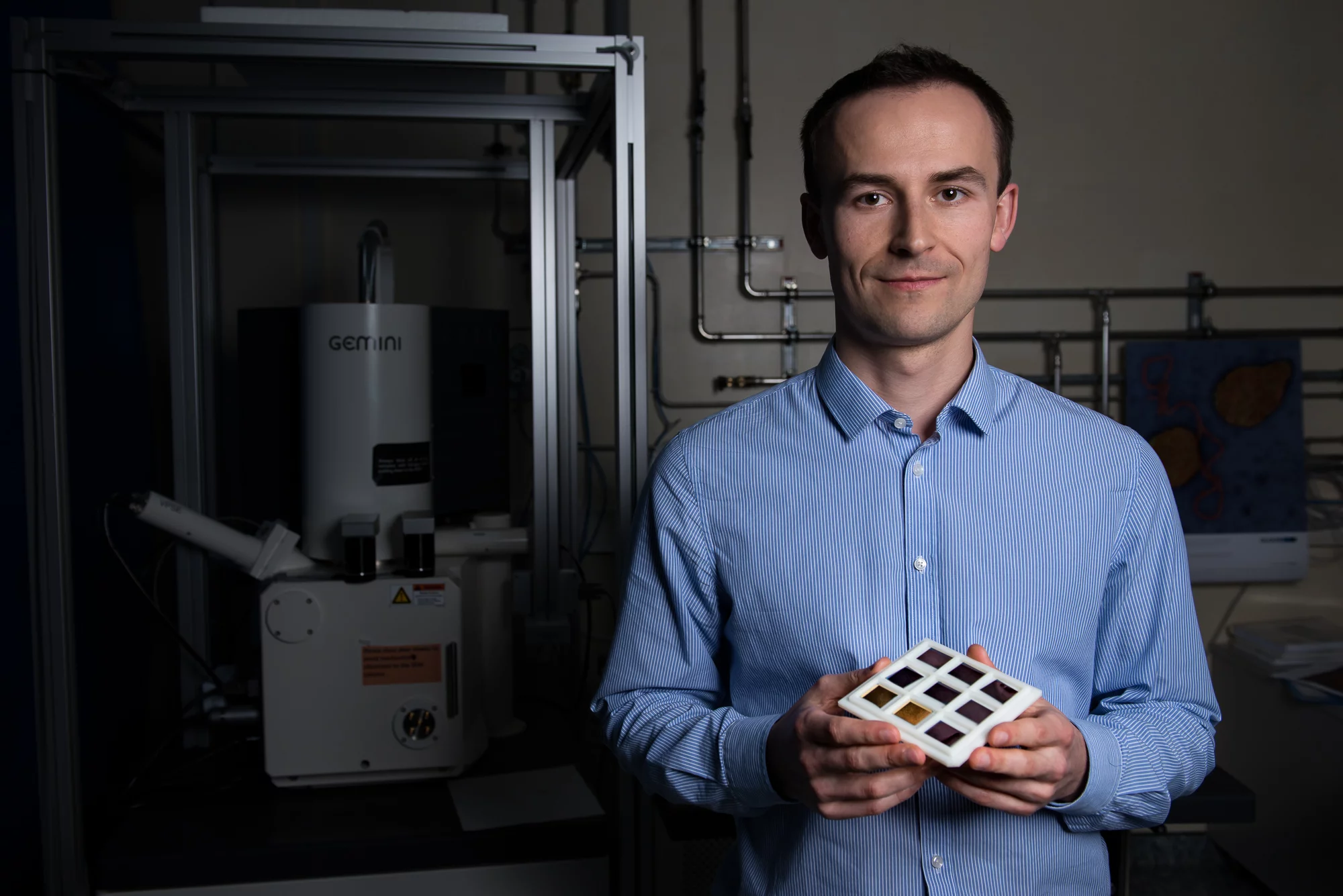Oles Sendetskyi wants to use polarity reversal in nanomagnets to develop a sustainable power source for small devices.
Ukrainian Oles Sendetskyi deals with magnets so tiny that they amount to just one-thousandth of the width of a human hair. Yet the 27-year-old's ambitions are anything but tiny. Today many processes for sustainable production of electric power are inefficient or too expensive
, says Sendetskyi, and I want to help to change that.
The winner of the Founder Fellowship of the Paul Scherrer Institute PSI wants to lay the foundation for power production using nanomagnets.
Oles Sendetskyi received his bachelor's degree in physics in Kiev, and he completed his master's degree within the framework of the EU's Erasmus Mundus Programme for students from outside Europe in Rennes, Munich, Grenoble – and Villigen, where he was a trainee in the Laboratory for Neutron Scattering. After this, for his doctoral work, he returned to PSI, which had impressed him with its many large-scale research facilities. Sendetskyi investigated the behaviour of nanometre-scale magnets that spontaneously reverse polarity – that is, their magnetic direction. He asked himself if this effect, which has impeded the further miniaturisation of hard drives, might not also be used positively to produce electric power. After a few inquiries he realised that no one had thought of this before. As a student I had the feeling that it would be nearly impossible to discover something new myself
, says Oles Sendetskyi. But there will always be things that the others haven't imagined.
In January Oles Sendetskyi attended the information session on the Founder Fellowship, where Christian Brönnimann, CEO of Dectris – a PSI spin-off that has been developing X-ray cameras since 2006 – told about the founding of his company. The Dectris success story strengthened Oles Sendetskyi's own resolve to give it a try as an entrepreneur. In the coming 18 months he wants to build a prototype consisting of millions of nanomagnets. Through spontaneous or stimulated polarity reversal, each magnet generates current that flows directly into a device or to storage in a capacitor. With this the smallest devices, such as sensors or watches, could be constantly supplied with electrical energy. And already, from the observation of tiny magnets, an idea has arisen that could eventually shake up a 40-billion-market like the clock and watch industry.
Text: Joel Bedetti
Contact
Oles SendetskyiLaboratory of Micro and Nanotechnology
Paul Scherrer Institute, 5232 Villigen PSI, Switzerland
Telephone: +41 56 310 54 87, e-mail: oles.sendetskyi@psi.ch
John Paul Millard
Technology Transfer
Paul Scherrer Institute, 5232 Villigen PSI, Switzerland
Telephone: +41 56 310 41 83, e-mail: john.millard@psi.ch
From researcher to entrepreneur
With the new Founder Fellowship, the Paul Scherrer Institute PSI gives young researchers the chance to become entrepreneurs. Within 18 months they have to demonstrate the commercialisation potential of their business ideas and draw up an initial business plan. On 8 November 2017, the official ceremony awarding this grant to three researchers took place. The first three prize winners are working on a new pharmaceutical technology, a nano-energy technology, and a neutron detector. UBS supports this initiative with a contribution to the grants.Because the road from a promising research result to an innovative and commercially viable product is long and rocky, many good ideas die in an early dry stretch. That is why the Paul Scherrer Institute has brought a new funding instrument into being with the Founder Fellowship, an 18-month grant that supports young researchers and engineers of PSI on the entrepreneurial career path, financially as well as with coaching and counselling.
We want to promote entrepreneurship and an entrepreneurial culture at PSI, explains John Millard of the Technology Transfer office.
With the Founder Fellowship, we can embolden talented researchers at PSI to pursue their promising business ideas and found a spin-off.
The Founder Fellowship is endowed with 150,000 Swiss francs per person, which the winner can use for salary, material, or other costs. During the 18 months, the Fellows are given full access to the PSI research facilities. After that, though, they have to leave the Paul Scherrer Institute.
We want to draw a clear line, John Millard says.
In fact, there doesn't have to be either a finished product or a prototype after the Fellowship has run its course; but it must be clear whether or not the technology can be commercialised.As a next step, the researchers would then devote themselves to the search for investors and found a spin-off.
In January, PSI called on its researchers to apply for a Founder Fellowship. During the summer an external expert panel selected, out of the business ideas submitted for the first round of the Founder Fellowship, three winners who were given their Fellowship certificates at a ceremony on 8 November. Convinced of the usefulness of this measure, UBS contributed to the grants. UBS Regional Director Aargau/Solothurn Thomas Sommerhalder explains:
It is already impressive to see what intellectually promising high-tech business ideas are being developed here at PSI. For us it is a central concern to support the development of start-ups in our region, in order to strengthen the business and innovation power of the canton in a sustainable way.
In the new year another round of competition for the Founder Fellowship will be announced.
Our goal is to firmly establish the Founder Fellowship as a funding instrument for budding entrepreneurs at PSI, explains John Millard.

